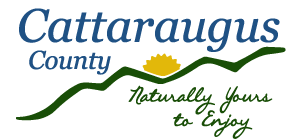The enhanced 9-1-1 Service you have come to expect on your land-line (wired) telephone in your house has been in place in Cattaraugus County since late 1992. Several years of work went in to appropriately designating road names and addressing all structures. Addressing work is a continual process that is done by our office in coordination with the various towns, cities and villages in the county.
A 9-1-1 Call is answered:
Dispatchers are trained professionals who take their jobs very seriously. When a landline 9-1-1 call comes in, an address, telephone subscriber name, and telephone number are displayed on a screen. Also on the screen is information about what fire department, EMS service or police agency serves the address you are calling from. The dispatcher always try to obtain the following information:
- Ask what the emergency is.
- Ask or confirm your name.
- Ask or confirm your address and where the emergency is.
- Ask who is the victim or complainant, if relevant.
- Once the dispatcher has this information, they may ask additional questions, particularly on EMS and Police calls. The may ask you if you are willing to provide first aid to a victim, how many cars are in an accident, how many people are injured, where a suspect is, or many other questions. Cooperating with a dispatcher can help speed the process of getting help to a location and can help you remain calm and helpful.
It is important for you to know that with a cellular phone, 9-1-1 calls come in differently. All wireless providers that operate in Cattaraugus County have the ability to send your location to us. This is done by various methods and results in us having your latitude and longitude, which we can then plot on a map to find you. HOWEVER, differences in telephone handsets, your location (i.e. inside a building or a car), and technical difficulties with the cellular provider may make this information unavailable to dispatchers. Try your best to know where you are when you call 9-1-1 on a cellular phone!
Our dispatchers are trained to provide callers with instructions on how to perform certain lifesaving activities through a program called "Emergency Medical Dispatch" or "EMD". This system gives our dispatchers the ability to help you perform first aid, cardiopulmonary resuscitation (CPR), and even use an Automated External Defibrillator (AED).
The appropriate public safety response is dispatched:
Based on the information you give a dispatcher, they dispatch the proper police, fire or EMS agency to the location of the emergency. Sometimes, a dispatcher may keep you on the line while help is responding and go through the dispatch procedure for that agency while you are on the phone with them. In other instances, another dispatcher may complete this task for them. In either case, remain calm and continue to cooperate with the dispatcher. Until help arrives, they are the vital link between you and the help you need.
